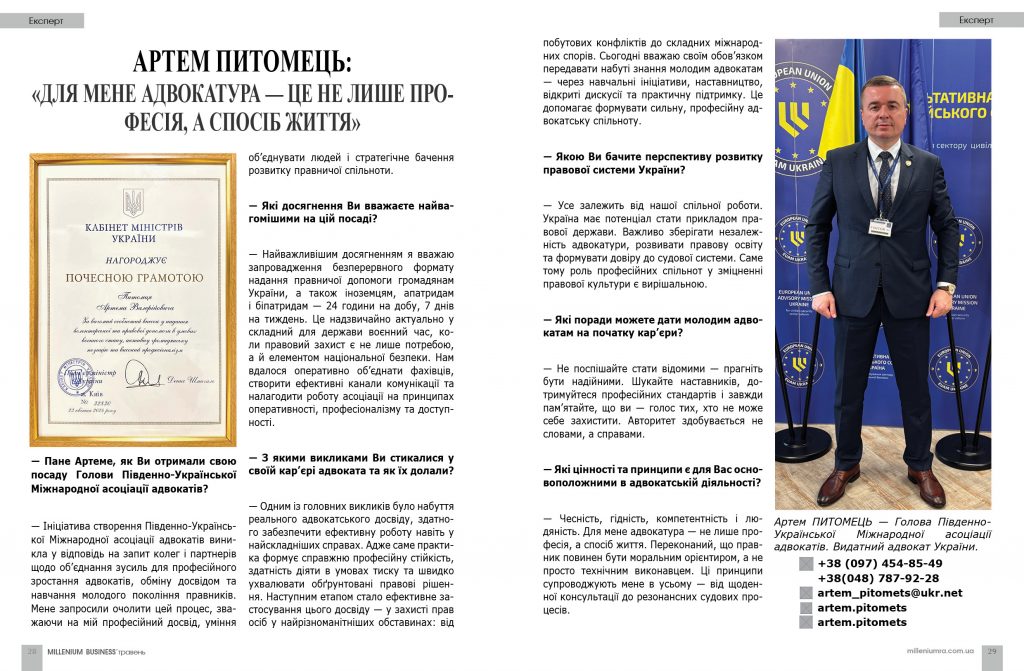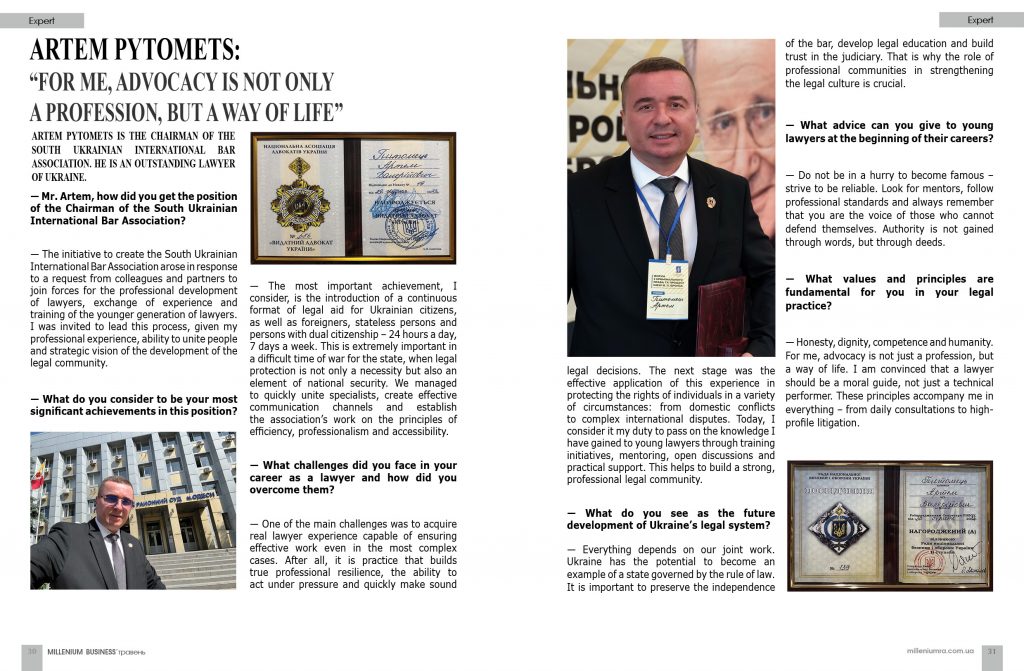
— Пане Артеме, як Ви отримали свою посаду Голови Південно-Української Міжнародної асоціації адвокатів?
— Ініціатива створення Південно-Української Міжнародної асоціації адвокатів виникла у відповідь на запит колег і партнерів щодо об’єднання зусиль для професійного зростання адвокатів, обміну досвідом та навчання молодого покоління правників. Мене запросили очолити цей процес, зважаючи на мій професійний досвід, уміння об’єднувати людей і стратегічне бачення розвитку правничої спільноти.
— Які досягнення Ви вважаєте найвагомішими на цій посаді?
— Найважливішим досягненням я вважаю запровадження безперервного формату надання правничої допомоги громадянам України, а також іноземцям, апатридам і біпатридам — 24 години на добу, 7 днів на тиждень. Це надзвичайно актуально у складний для держави воєнний час, коли правовий захист є не лише потребою, а й елементом національної безпеки. Нам вдалося оперативно об’єднати фахівців, створити ефективні канали комунікації та налагодити роботу асоціації на принципах оперативності, професіоналізму та доступності.
— З якими викликами Ви стикалися у своїй кар’єрі адвоката та як їх долали?
— Одним із головних викликів було набуття реального адвокатського досвіду, здатного забезпечити ефективну роботу навіть у найскладніших справах. Адже саме практика формує справжню професійну стійкість, здатність діяти в умовах тиску та швидко ухвалювати обґрунтовані правові рішення. Наступним етапом стало ефективне застосування цього досвіду — у захисті прав осіб у найрізноманітніших обставинах: від побутових конфліктів до складних міжнародних спорів. Сьогодні вважаю своїм обов’язком передавати набуті знання молодим адвокатам — через навчальні ініціативи, наставництво, відкриті дискусії та практичну підтримку. Це допомагає формувати сильну, професійну адвокатську спільноту.
— Якою Ви бачите перспективу розвитку правової системи України?
— Усе залежить від нашої спільної роботи. Україна має потенціал стати прикладом правової держави. Важливо зберігати незалежність адвокатури, розвивати правову освіту та формувати довіру до судової системи. Саме тому роль професійних спільнот у зміцненні правової культури є вирішальною.
— Які поради можете дати молодим адвокатам на початку кар’єри?
— Не поспішайте стати відомими — прагніть бути надійними. Шукайте наставників, дотримуйтеся професійних стандартів і завжди пам’ятайте, що ви — голос тих, хто не може себе захистити. Авторитет здобувається не словами, а справами.
— Які цінності та принципи є для Вас основоположними в адвокатській діяльності?
— Чесність, гідність, компетентність і людяність. Для мене адвокатура — не лише професія, а спосіб життя. Переконаний, що правник повинен бути моральним орієнтиром, а не просто технічним виконавцем. Ці принципи супроводжують мене в усьому — від щоденної консультації до резонансних судових процесів.
ARTEM PYTOMETS: “FOR ME, ADVOCACY IS NOT ONLY A PROFESSION, BUT A WAY OF LIFE”
Artem Pytomets is the Chairman of the South Ukrainian International Bar Association. He is an outstanding lawyer of Ukraine.

— Mr. Artem, how did you get the position of the Chairman of the South Ukrainian International Bar Association?
— The initiative to create the South Ukrainian International Bar Association arose in response to a request from colleagues and partners to join forces for the professional development of lawyers, exchange of experience and training of the younger generation of lawyers. I was invited to lead this process, given my professional experience, ability to unite people and strategic vision of the development of the legal community.
— What do you consider to be your most significant achievements in this position?
— The most important achievement, I consider, is the introduction of a continuous format of legal aid for Ukrainian citizens, as well as foreigners, stateless persons and persons with dual citizenship – 24 hours a day, 7 days a week. This is extremely important in a difficult time of war for the state, when legal protection is not only a necessity but also an element of national security. We managed to quickly unite specialists, create effective communication channels and establish the association’s work on the principles of efficiency, professionalism and accessibility.
— What challenges did you face in your career as a lawyer and how did you overcome them?
— One of the main challenges was to acquire real lawyer experience capable of ensuring effective work even in the most complex cases. After all, it is practice that builds true professional resilience, the ability to act under pressure and quickly make sound legal decisions. The next stage was the effective application of this experience in protecting the rights of individuals in a variety of circumstances: from domestic conflicts to complex international disputes. Today, I consider it my duty to pass on the knowledge I have gained to young lawyers through training initiatives, mentoring, open discussions and practical support. This helps to build a strong, professional legal community.
— What do you see as the future development of Ukraine’s legal system?
— Everything depends on our joint work. Ukraine has the potential to become an example of a state governed by the rule of law. It is important to preserve the independence of the bar, develop legal education and build trust in the judiciary. That is why the role of professional communities in strengthening the legal culture is crucial.
— What advice can you give to young lawyers at the beginning of their careers?
— Do not be in a hurry to become famous – strive to be reliable. Look for mentors, follow professional standards and always remember that you are the voice of those who cannot defend themselves. Authority is not gained through words, but through deeds.
— What values and principles are fundamental for you in your legal practice?
— Honesty, dignity, competence and humanity. For me, advocacy is not just a profession, but a way of life. I am convinced that a lawyer should be a moral guide, not just a technical performer. These principles accompany me in everything – from daily consultations to high-profile litigation.
